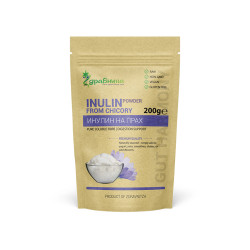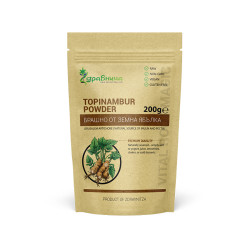Inulin is a kind of soluble fiber, which is contained in many plants. By taking inulin, the intestinal bacteria in our body turn it into short-chain fatty acids that provide a number of benefits to our health.
Inulin can be encountered in natural form but can also be modified for commercial use.
Natural sources of inulin:
As already mentioned, inulin is found in most plants. In much of these plants, however, the content of inulin is very low. There are plants that have a high content of soluble fiber. Here's how much inulin is contained in 100 g of the following plants:
- Chicory roots: 36 - 48 g
- Garlic: 9 - 16 g
- Asparagus: 2 - 3 g
- Onion: 1-8 g
Production forms of inulin:
Inulin is available as a food supplement or as a component of protein and cereal bars, yoghurt and more. Production inulin is available in several forms:
- Native chicory: Extracted from chicory root.
- Oligofructose: Made by removing the longer molecules from inulin.
- HP: High-performance (HP) inulin is created by removing the shorter molecules from it.
- FOS: Fructooligosaccharides (FOS) consist of short inulin molecules synthesized from table sugar.
Health Benefits of Inulin:
Inulin is a prebiotic that increases the good bacteria
Inulin acts as a prebiotic as an indigestible nutrient that nourishes the "good" bacteria in the intestines.
Inulin is the main food for bifidobacteria and stimulates their growth and activity. Bifidobacteria have a number of important functions in our body, including:
- produce acetic acid and lactic acid, which reduces the pH of the colon and prevents the growth of "bad" bacteria in the intestine;
- stimulate the immune system;
- help absorb some minerals;
- Increase the production of B vitamins such as folate, B12, thiamine and niacin.
Inulin prevents constipation
Due to its ability to swell up after absorbing water, inulin is very effective in reducing constipation. A study (DB-RCT) was conducted in which 17 constipated children, 2-5 years of age, were given inulin and their stool consistency was monitored. Children who took these inulin-type fructans had softer stools.
For better anti-constipation effects, it is advisable to use inulin in combination with Aloe - dry extract (aloe bitter crystals).
Inulin reduces appetite and helps to lose weight
When added to low-calorie foods, inulin acts effectively to suppress appetite and control food intake.
Inulin helps reduce appetite in several ways:
- By increasing the production of the hormone that controls the appetite - YY.
- By increasing a glucagon-like peptic that is released after a meal and helps slow down the emptying of the stomach.
- By changing the neuronal activity in the brain to suppress appetite.
Inulin reduces cholesterol and improves heart health
Inulin improves heart health by reducing blood fat levels through various mechanisms:
- reduces the production of liver enzymes responsible for fat production;
- Enhances enzymes that break down muscle fat;
- Helps produce peptides that increase the feeling of satiety and remove "bad" cholesterol in the blood.
Inulin improves the absorption of magnesium and calcium
In a study (DB-RCT), 15 postmenopausal women were involved. Participants are divided into two groups, the first taking inulin for 6 weeks and the second group receiving placebo. In women who received inulin, an increased absorption of magnesium was found.
The cause of the observed reaction was also found. Inulin causes the production of short-chain fatty acids that reduce the pH in the colon. This increases the solubility of calcium and magnesium, making substances easier to absorb.
Side effects of inulin
Inulin is safe to use and consume. This has been confirmed by both EU health authorities and the US Food and Drug Agency.
- Intestinal discomfort, including flatulence, bloating, stomach noises, belching and cramping.
- Swelling of the colon.
- Diarrhea.
- Although rare, severe allergic reactions can occur. In some isolated cases, it has resulted in an allergic reaction, possibly linked to a food allergy response.
Dosage
Average US inulin consumption is estimated at between 1 and 4 g. In Europe, an average dose of 3 to 11 g is given.
Doses up to 10 g (inulin from a natural source) are well tolerated and effective.
A series of clinical trials have shown that the daily dose of inulin may increase to 20 g without the occurrence of side effects.





